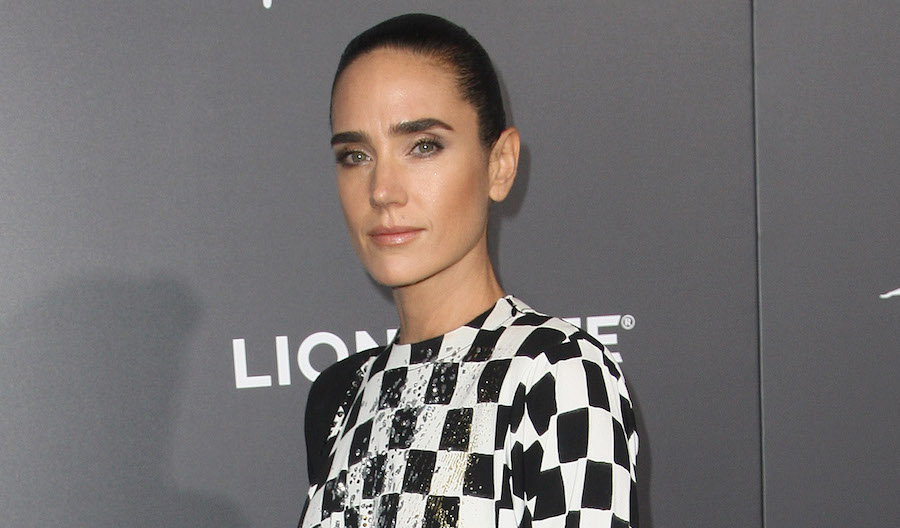Jennifer Connelly was supposed to be in “American Pastoral” years ago. The project, adapted from Philip Roth’s Pulitzer Prize-winning 1997 novel, had been in development hell for almost a decade, sometimes looking like it might happen, then spending years in oblivion. It finally did happen, with Connelly as Dawn, a former beauty pageant contestant who married a Jewish glovemaker known as “The Swede” (Ewan McGregor, who also directed). They seem to have the perfect life. But in 1968, their teenage daughter, Merry (Dakota Fanning), becomes so incensed about the Vietnam War she becomes an activist, eventually blowing up a building and killing a man. She then goes underground, leaving her parents to take separate paths: The Swede struggles to find her while Dawn accepts that she’s never coming back. The Oscar-winning actress, 45, talks to us about carrying over the complexity from Roth’s book and finding compassion for a difficult character.
In the book and the movie, there’s a great empathy for people who make what could be seen as bad decisions. RELATED: Interview: Dakota Fanning on “American Pastoral” and not overthinking it That passage you mentioned is one of my favorite parts of the book: We really do always fail to understand each other and wind up being reductive, even when we have good intentions. It’s an interesting twist that Dawn and the Swede aren’t pro-war. They’re progressives. I’m not a parent, but I can still imagine what it must be like to read this and worry that even good parenting doesn’t ensure something like this happening. In the film’s second half, Dawn, unlike her husband, decides to accept that Merry isn’t coming back. She gets a facelift and almost becomes almost Stepfordish. As the actor playing her, how did you come to justify her decisions? I’m always jealous that actors get to embody people who make decisions like that. Moreso than a reader or a viewer, you’re really forced to get into unusual headspaces.
I think the movie talks about judgment. We hear that in the narration at the end of the film: Nathan [the narrator, played by David Strathairn] says we get people wrong. That’s certainly true about Dawn. People make decisions about her based on the fact that she had been a contestant in a beauty pageant and what she looks like. She’s trying to understand her own purpose and find her value, a sense of her place in the world. She finds that in her relationships with her husband and her daughter. So it’s particularly tragic when her daughter ultimately rejects her.
It’s a treacherous thing to do, to take such a black-and-white perspective on each other. It’s explored really well in the scene between the Swede and Rita Cohen [a young activist who claims to be in cahoots with Merry when she’s underground]. She’s saying he exploits his works; she’s accusing him of things that are certainly pitfalls of capitalism. But he’s not so guilty of the specific things she’s accusing him of.
[Laughs] Yes, they are. Their politics are pretty much aligned with their daughter’s. And Merry’s not wrong that there is great injustice. She’s not wrong that for some people to succeed in a capitalist world, some people are exploited.
You never know what will make an impression on your kids. You can only do so much to prevent them coming into contact with things that could potentially lead them in certain directions. You just try to instill the best in them and try to arm them with good education and love and communication.
When her daughter makes it very clear she wants nothing to do with her parents, Dawn feels that. She internalizes that. She acknowledges her daughter’s position, and she waits for a number of years to feel that in her bones, to make sure that she’s not coming back. And she’s completely undone by that. She’s completely destroyed by her grief. She tears everything down that’s left standing. She needs to start again, and write a new narrative for her life, just in order to survive. It’s very sad. But she’s looking to the future, and the Swede is looking to the past. I think she’s heartbroken that he’s not going there with her. From her point of view, it’s not that she wants to leave him; it’s that he won’t be in the present with her. He’s stuck in the fantasy. When she says, “When are you going to give up on her?,” it’s pain. For me, it’s an expression of pain and sadness that her husband is also leaving her.
Look, I can’t imagine making those choices. I don’t feel that she resembles me as a person. But I have a lot of compassion for her. And it’s really interesting as an exercise as an actor to spend time with a character who is so different, where I have to learn to really understand her perspective and her point of view.
Jennifer Connelly on finding compassion for her ‘American Pastoral’ character

Getty Images
Follow Matt Prigge on Twitter @mattprigge


















